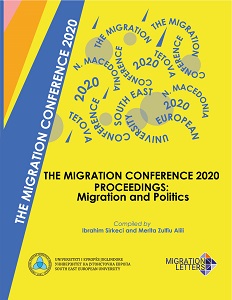Improvement Of Relationship Between Israeli Employers And Thai Migrant Agricultural Workers: Positive Social Contact And Cooperative Conflict Management Approaches As Potential Tools?
Improvement Of Relationship Between Israeli Employers And Thai Migrant Agricultural Workers: Positive Social Contact And Cooperative Conflict Management Approaches As Potential Tools?
Author(s): Kuanvinit Parkpoom
Subject(s): Agriculture, Labor relations, Migration Studies, Human Resources in Economy
Published by: Transnational Press London
Keywords: Improvement; Israeli employers; Thai migrant agricultural workers; positive social contact; cooperative conflict management approaches;
Summary/Abstract: In 2012, Israeli and Thai governments signed a bilateral agreement titled “Thailand-Israel Cooperation on the Placement of Workers” to provide transparent recruitment and labor right protection mechanism to Thai agricultural migrant workers in Israel. Whereas up to 25,000 Thai male and female workers have been currently employed in Israel under the bilateral agreement (Department of Employment of Thailand, 2020), a large number of workers have suffered psychological distress and labor right abuses (Griffin and Soskolne, 2003; Human Rights Watch, 2013; BBC, 2018). The purpose of the present research is to better understand the correlation of relationships between Israeli employers and Thai workers and the likelihood of rights abuse and psychological distress experienced by Thai workers, and to explore the roles of social contacts as well as the conflict management approaches toward relationships between Thai workers and Israeli employers. Four research questions are formulated to conduct the research; (I) How are qualities of employer-employee relationships related to the possibility that Thai workers suffer rights abuse ?; (II) How are qualities of employer-employee relationships related to the vulnerability to psychological distress experienced by Thai workers?; (III) How do social contacts play roles in relationships between Israeli employers and Thai workers?; and (IV) How do conflict management approaches play roles in relationships between Israeli employers and Thai workers? Based on the qualitative interviews with nineteen Thai male and female workers in Israel, the results depicted that the more positive interpersonal relationship Thai workers have with their Israeli employers, the lower degree of right abuse Thai workers were likely to experience. Although there is no clear association between employer-employee relationship and the degree of psychological distress in this study, the level of right abuse is regarded one of the distress instigators. Interpersonal relationship between Israeli employers and Thai workers can also have indirect correlation with the degree of psychological distress experienced by the workers. In addition, positive social contact and cooperative conflict management approach can potentially contribute to the improvement of employer-employee relationship between Israeli employers and Thai workers. Therefore, this research argues that the improvement of employer-employee relationship can be taken into consideration as a way to tackle labor right abuse and psychological distress problems that Thai workers have experienced.
Book: The Migration Conference 2020 Proceedings: Migration and Politics
- Page Range: 217-232
- Page Count: 16
- Publication Year: 2020
- Language: English
- Content File-PDF

